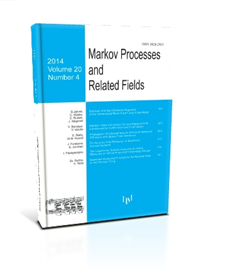Sampling at a Random Time with a Heavy-Tailed Distribution
S.G. Foss, D. Korshunov
2000, v.6, Issue 4, 543-568
ABSTRACT
Let $S_n = \xi_1+\cdots+\xi_n$ be a sum of i.i.d. non-negative random variables, $S_0=0$. We study the asymptotic behaviour of the probability $\P\{X(T)>n\}$, $n\to \infty$, where $X(t)=\max\{n\ge 0:S_n\le t\}$, $t\ge 0$, is the corresponding renewal process. The stopping time $T$ has a heavy-tailed distribution and is independent of $X(t)$. We treat two different approaches to the study: via the law of large numbers and by using the large deviation techniques. The first approach is applied to the case when $T$ has a heavier tail than $\exp(-\sqrt x)$. The second one is mostly applied to the case of the so-called ``moderately heavy tails'' when $T$ has a lighter tail than $\exp(-\sqrt x)$. As a corollary, the distributional Little's law allows us to obtain the tail asymptotics for a stationary queue length in a single server queue with subexponential service times. More generally, if a stable queueing system satisfies the distributional Little's law and if a stationary sojourn time distribution of a ``typical'' customer is heavy-tailed and its asymptotics is known, then the results of this paper provide a way for obtaining the tail asymptotics for a stationary queue length.
Keywords: sums of i.i.d. random variables,renewal process,independent stopping time,heavy-tailed distribution,large deviations,Cramer transform,rate function,single server queue,stationary queue length
COMMENTS
Please log in or register to leave a comment

